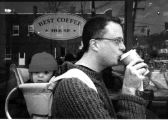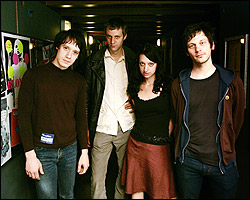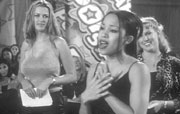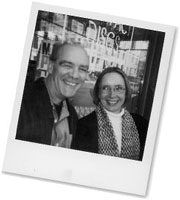A VERY CLOSE friend of mine recently had the audacity to admit he’d been thinking that maybe Neil Young is “not all that.” Not all that? The argument would’ve come to fisticuffs had this friend not conceded that he was basically playing devil’s advocate, working on an argument to pose against the strongly held opinions of his friends.
Perhaps William Echard, assistant professor of music at Carleton University in Ottawa, Canada, and a panelist in the discussion titled “Artists in Review,” could take my friend on in a couple rounds of verbal sparring. Echard has devoted much of his research and evaluation time to studying fellow Canadian Neil Young’s career. Through Buffalo Springfield, Crazy Horse, CSNY, and the various solo and group adventures before and after those bands, Young’s career has waxed and waned through country, folk, blues, rock, and even skinny ties and crappy pop. And Echard has dissected it all.
He’s focused on the diverse turns that Young’s career has taken and his unique ability to successfully navigate the fickle waters of rock and roll for far longer than most musicians of his ilk. Since Echard will be here in Seattle, I asked him about Young’s associations with Pearl Jam and the period in his career when the tagline “Godfather of Grunge” followed him around like a bad odor.
“I remember having the impression that the Pearl Jam thing seemed more like a matter of exploring an affinity that was already there between [Neil Young] and the younger musicians [and] fans. It didn’t look like something anyone went out of their way to create (although clearly Neil did go out of his way to take advantage of it once the situation arose),” says Echard in an e-mailed discussion.
“As for why [Young] continues to seem more relevant than some other people of his generation, who knows?” poses Echard. “Part of it is productivity and frequency of touring. Part of it is probably the fact that he had created such a wide range of styles and repertoire for himself that it’s easier to be fresh even if only playing the old material. I think another key thing is the way that [Young] was always an insider/outsider in rock culture. The way that he would sometimes challenge and reject aspects of rock ideology allowed him to blend a little more smoothly into the punk and post-punk eras. But at the same time, the way that he questioned rock while still being a rock icon left his access to the classic-rock crowd intact.”
Laura Learmonth
Echard’s panel is at 4 p.m. on Fri., April 12.








